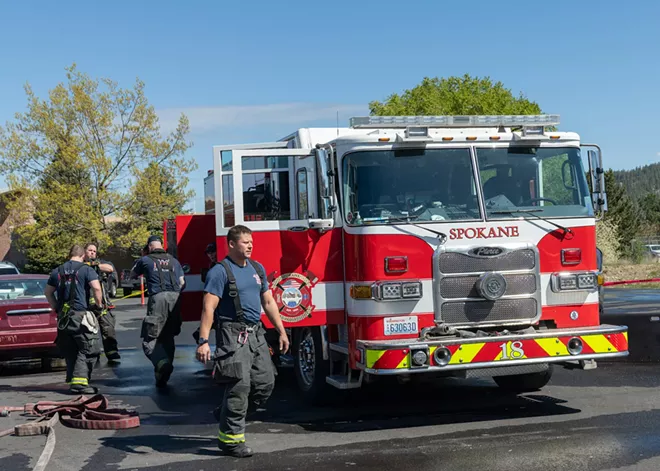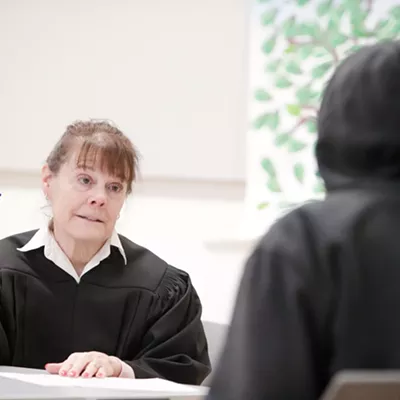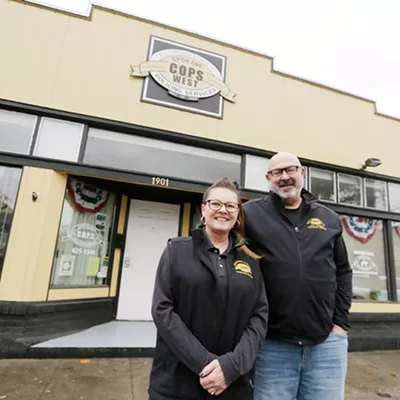Julie O'Berg still remembers her first fire.
It was winter in Kansas more than three decades ago. A duplex had gone up in flames after a man tried to fix his motorcycle's carburetor indoors. O'Berg was working as a paramedic to pay medical school bills, and the job required that paramedics double as firefighters.
O'Berg hadn't planned on becoming a firefighter — but after that first fire, she was hooked.
"That was it, no more medical school," O'Berg says. "I can probably remember that better than any fire that I've ever been on."
O'Berg spent 28 years as a firefighter in Kansas. In 2020, she moved to Spokane, where she worked as deputy chief of operations for the Spokane Fire Department. When former Fire Chief Brian Schaeffer retired at the start of this year, newly elected Mayor Lisa Brown asked O'Berg to fill in as interim chief while the city searched for a permanent replacement.
The search didn't last long. In April, Brown decided to permanently appoint O'Berg to the position.
"I have reviewed internal survey results, received feedback and seen Chief O'Berg's performance over the past few months," Brown said in a statement. "She is an effective and well-respected leader who is a tremendous asset to our fire department and the Spokane community."
O'Berg is taking on the job of chief at a challenging time.
The city's budget is in a bad place, and Brown has warned that cuts to fire and other departments might be necessary if the massive public safety tax levy she is proposing fails in August.
As overdose deaths continue to soar, the fire department is also playing an increasingly large role in responding to Spokane's mental health and substance use crises.
The department has a Behavioral Response Unit, which pairs a paramedic with a Frontier Behavioral Health worker to respond to overdose and mental health calls. The team currently operates just four days a week, but O'Berg says she'd like to see it expanded to seven days a week.
O'Berg also hopes to expand the department's Community Assistance Response (CARES) program, which provides case management to people struggling with behavioral health and substance issues. Last week, the City Council voted to put $500,000 in opioid lawsuit settlement funds toward the program.
The Inlander met with O'Berg last week at the department's training center to talk about her goals for the new job, budget challenges and the department's role in responding to Spokane's overdose crisis. Her answers have been lightly edited for length and clarity.
INLANDER: When Mayor Brown appointed you to be interim fire chief earlier this year, you initially said you didn't plan to apply for the permanent position. What changed your mind?
O'BERG: Working with Mayor Brown and her team and the team here certainly made the reconsideration easier. We've got a really strong, fantastic team here. We've got a lot of challenges that we're going to face in the next year, but I like the direction. Working with Mayor Brown's team and our team here at fire made it worth it to change my mind.
What does the job of fire chief mainly entail? Are you going to be in the field at all? Or is it more meetings and paperwork?
Yeah, it's a lot of meetings. Certainly on events of significance I may be there. If I show up, or the assistant chief or the deputy chiefs show up, we're showing up in support of their incident management plan.
So really, the fire chief's job is managing the budget. I'm overseeing each one of the divisions — operations and prevention and training and community risk and medical services. So a lot of computer work, paperwork, a lot of numbers. But it's rewarding, because I know that I'm getting the tools that are needed to the boots on the ground doing the job.
Do you think you'll miss being out in the field?
I've been out of the field as deputy chief for the last four years — it's mainly office work. So yeah, I've definitely missed that interaction with the community at that level, but again, you find a different way to get those rewards.
What do you see as the biggest challenges facing the department?
The budget. There's no secret that we face some really challenging budget times. Last week the council did approve the levy to go on the August ballot. Our next step is to really help educate the community on what that means. We absolutely know that is a big ask. But my job is to help explain and give the most transparent examples of what that will do and what that levy is needed for. So the budget is going to be a big challenge.
The fentanyl crisis and the opioid crisis is going to be another huge challenge that we've got to face. We're not the solution for that, but we're a big part of that.
Mayor Brown recently said the fire department's summer academy is going to have to be canceled this year because of budget problems. What was your reaction to that?
I was part of that decision. I think it's the right thing to do. The last two years, we've been working really hard on rebuilding our relief pool size — the relief pool is what helps us keep our overtime budget in check. That relief pool, it's not full, it's not where we need it to be, but it's healthier than it's been for years. So I think that we can manage the overtime budget within limits that we have not been able to for the past three years.
So that wasn't dictated by Mayor Brown or by the CFO, that was a team effort of really looking at where we can make changes. And we are doing that. We are scrutinizing our budget daily to areas that we can economize, areas that we can cut and still provide the same level of service to the community.
I think that was the right decision. A hard one, but the right decision.
Mayor Brown also recently warned that, if the public safety levy fails, the city might be forced to lay off 30 firefighters. Are you worried about that?
Oh, absolutely. I think if the levy doesn't pass, we'll be looking at a significant impact to the level of service that we provide, and to our staffing. We don't have the final picture of what that will look like.
Right now, we're working on developing two budgets — we're developing a budget as if the levy passes, and we're developing a budget if the levy doesn't pass.
It's the early days of that, but I think there is potential for us to have to lay off firefighters and other support staff. There's potential to really have to come to the community and say, "These are the services we provide, where does the community see the priority for those?"
How are things looking going into wildfire season this summer?
It's always a concern for us. The early forecasts are showing that it's what they're calling a "neutral forecast." So that means it could go either way. We are already concerned about the drought in our region. We are in a time when every season is going to be challenging, you just don't know how challenging it's going to be.
The good news is that by the end of the year, I believe we will exceed 1,000 acres of fuel mitigation that we've done. We're certainly better positioned than we were four years ago.
Are you optimistic that we'll be able to get the Latah Valley fire station built in the near future?
It depends on what your definition of "near future" is. Honestly, if you start planning a fire station today, "near future" means that's three, four, five years.
I think all of the stakeholders know that we need to be there. So just like anything else right now, the challenging part is finding that funding. Fire stations are not cheap to build. We were fortunate to get $300,000 from the state to go toward our current half-million dollars for the planning phase of that. So we will be starting down that road, but the full funding is what we're still getting determined.
"If the levy doesn't pass, we'll be looking at a significant impact to the level of service that we provide."
More broadly, how do you see the department's role going forward when it comes to the drug overdose crisis?
I think we have a primary role. I think we have to reimagine that that primary role is not in a firetruck. It's that CARES expansion, it's that Behavioral Response Unit expansion. The reason I think we're in the right place is because our units are spread throughout the city, our stations are placed in very strategic areas for a reason. We can make sure we blanket all areas, and we have that training as far as that patient care aspect.
I think we can provide that through these expansions. We've got the right foundation, but adding that different response modality and expanding that, I think we really are the right department to be a part of that.
What are you most excited about with your new role?
When you're in this position, or even in one of the deputy chief positions, you realign what rewards you in a job. What used to reward us was showing up on a scene, mitigating an emergency and making that immediate impact. For me, what's rewarding is knowing my impact to those that are out in the field, whether it's an operation or prevention or training. My impact is giving them the tools they need. I like watching people excel at their job. And so if I can take hurdles out of their way, if I can give them the tools that they need to excel and do good things, that's rewarding.
Are there any new projects planned for the future?
Hopefully in June we will be rolling out what is called the Nurse Navigation program. When somebody calls 911, the current call takers and 911 communication specialists, they triage those calls.
The low acuity calls will be transferred to Nurse Navigation. That's a team of licensed nurses that will continue to question the caller on what their needs are. And they can work with them to get them an appointment in urgent care, to get them a telehealth visit if that's appropriate. They can get them a Lyft or Uber ride to that urgent clinic or to a pharmacy if that's the need.
And what that will do is take a significant call volume load off the firetrucks and ambulances in the city. That leaves our emergency response units available for that true emergency.
One of my goals is to really focus on our mission critical needs. And I think that's fiscally responsible right now with our budget challenges: really focusing on our core values and our core mission. ♦



























